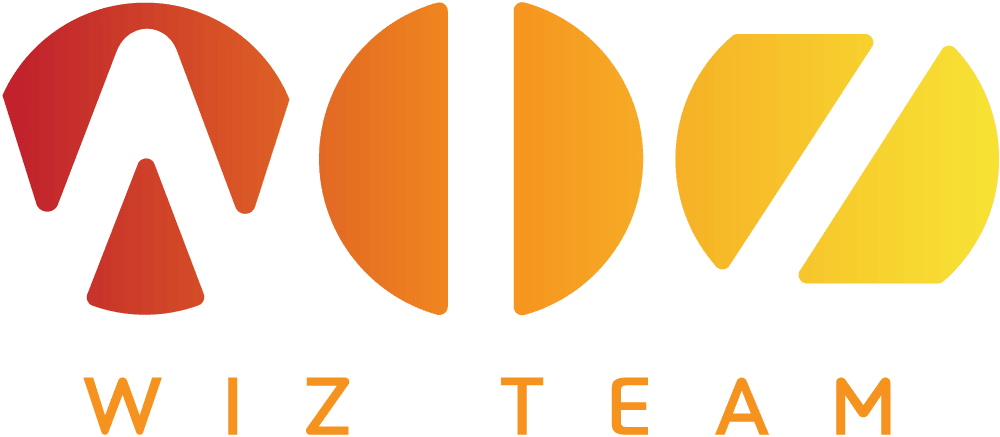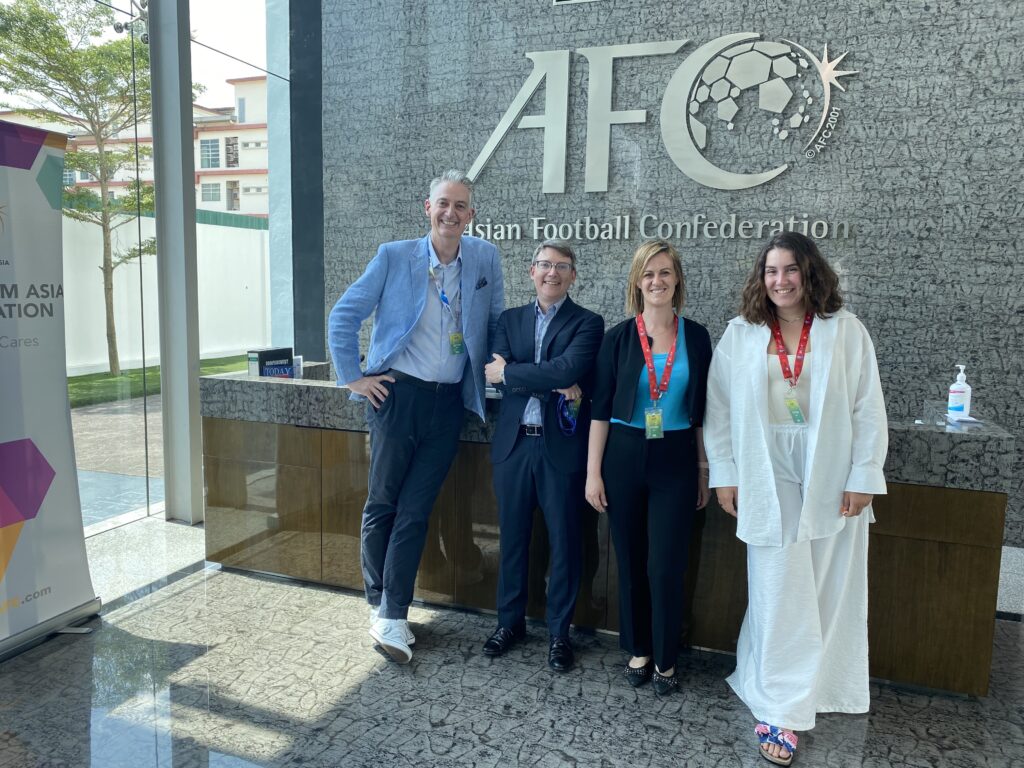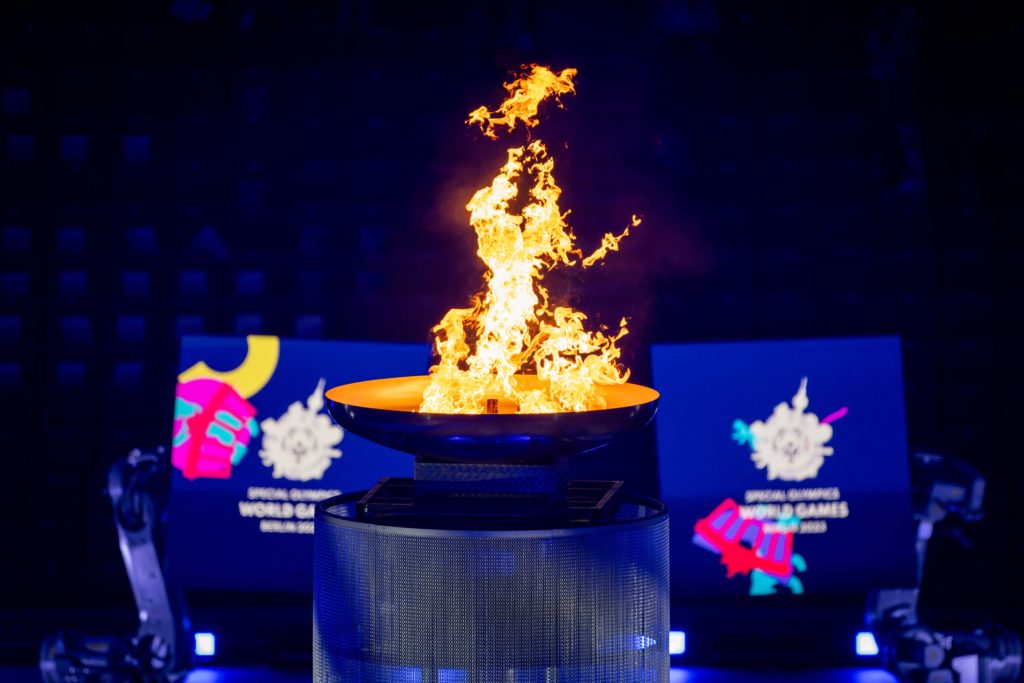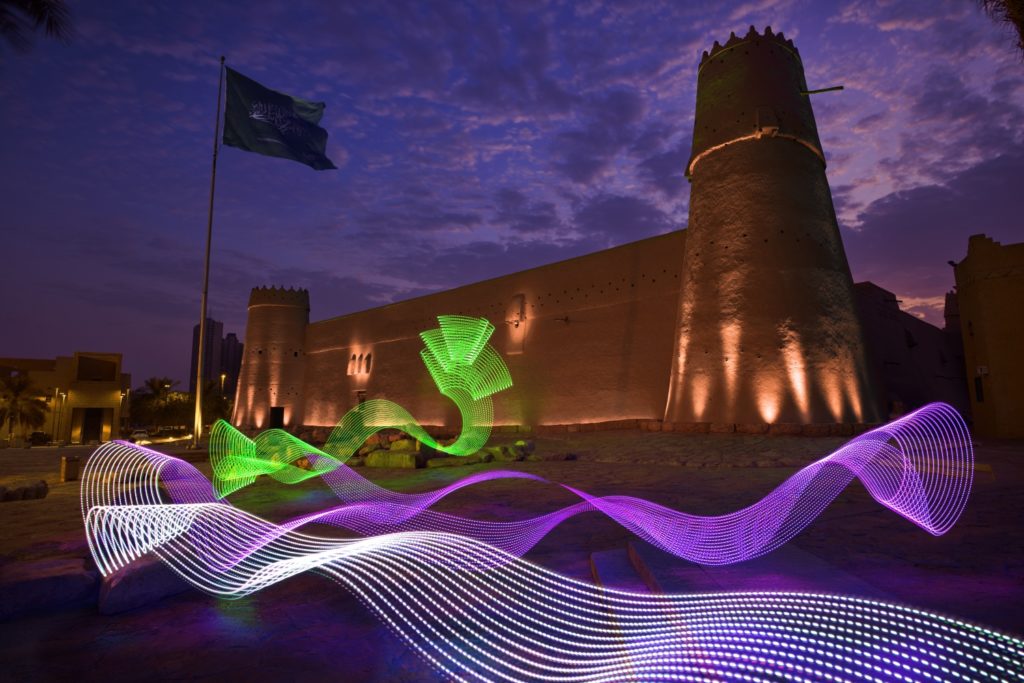If you’re an event planner, you know the real challenge of an event is everything that happens behind the scenes. From vendor schedules and guest lists to adapting to last-minute changes, event logistics can feel like a high-stakes balancing act. Even the smallest detail can make or break the experience for your stakeholders and guests.
But managing logistics doesn’t have to be stressful. With the right preparation, clear communication, and a strategic approach, you can turn complexity into confidence and keep your event running smoothly.
Ready to take the guesswork out of event logistics? Let’s explore practical ways to refine your event logistics for a successful event from start to finish.
Summary Highlights
- Effective event logistics require clear objectives, detailed planning, and a structured timeline.
- Key areas include vendor and supplier coordination, precise staff assignments, efficient budget management, and centralized communication.
- On-the-day logistics focus on early setup, real-time coordination, guest flow management, and rapid issue resolution.
- Post-event tasks like teardown, feedback, and financial review drive continuous improvement.
- Using technology like Wiz-Team’s Event-Works platform streamlines every phase of event logistics, ensuring successful events of any scale.
Phases of event logistics
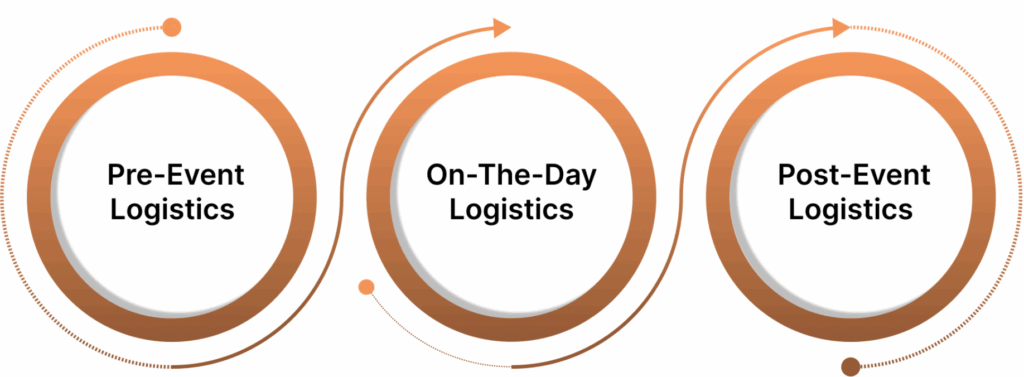
Each phase of event logistics serves as a unique role in the overall success of the event. From the meticulous planning that builds the framework to the on-the-day coordination and post-event evaluations, every phase works in tandem to ensure a seamless experience.
Phase 1: Pre-event logistics
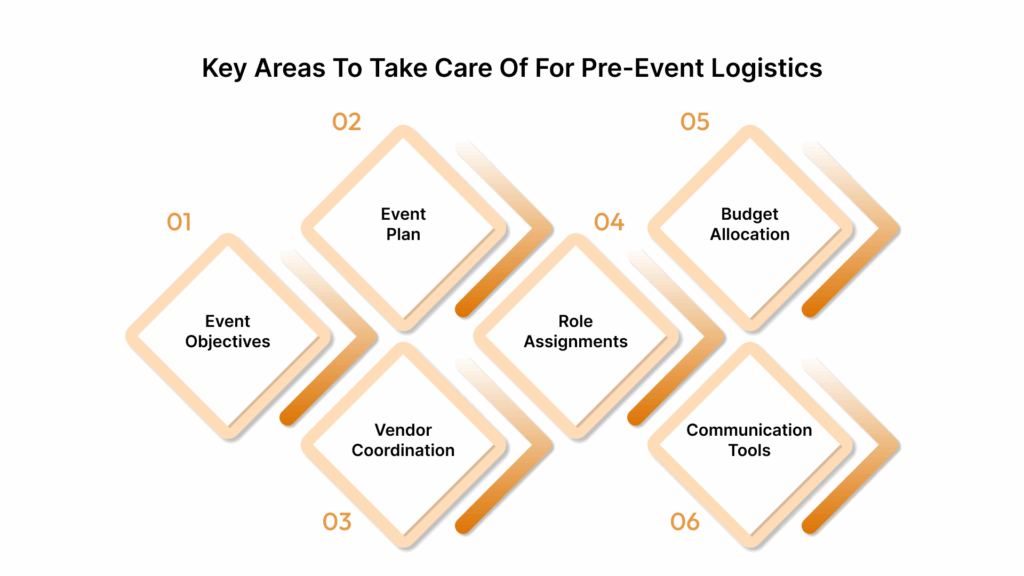
The pre-event logistics phase is the foundation for everything that follows. Without a solid plan, the event risks falling apart before it even begins. This phase involves strategic foresight, proactive planning, and meticulous attention to detail.
These are the key areas to take care of for pre-event logistics:
- Defining clear event objectives
- Creating a detailed event plan and timeline
- Vendor and supplier coordination
- Staff and role assignments
- Budget planning and resource allocation
- Communication tools and platforms
1. Defining Clear Event Objectives
Every logistical decision, from choosing the venue to designing the attendee experience, should align with the event’s purpose. Clear objectives help prioritize resources, timelines, and staffing, ensuring everything works toward a common goal.
For example, If the goal is networking at a conference, the logistics will focus on creating spaces conducive to conversation and movement. If it’s a product launch, the logistics will revolve around showcasing the product seamlessly, ensuring tech setups are flawless, and managing the flow of attendees through the experience.
2. Creating a Detailed Event Plan and Timeline
With clear objectives, the next step is creating a comprehensive event plan. This includes setting a timeline, breaking the event into actionable phases, and assigning deadlines for each task. A well-organised timeline keeps the team accountable and ensures nothing is left to chance.
Here’s a breakdown of an effective timeline for event logistics:
| Phase | Key Activities | Timeframe |
| Pre-event Preparation |
| 6-12 months before the event |
| Finalizing Details |
| 3-6 months before the event |
| Final Week Countdown |
| 1 week before the event |
Create contingency periods within the timeline to account for any delays or last-minute changes. These buffers are crucial for mitigating risks.
3. Vendor and supplier coordination
Vendors and suppliers are the hands and feet of managing event logistics. Whether it’s food, AV equipment, or decor, their services must be aligned with your event’s timeline, and their performance must meet expectations. Lack of clarity here can result in delays, quality issues, and logistical nightmares.
Clear Agreements
Set expectations up front in the contract, detailing delivery times, roles, and responsibilities. It is very important for the vendors to understand their roles and deliverables.
Frequent Check-Ins
Monitor progress regularly, especially as the event date approaches, to ensure no last-minute issues.
Backup Options
Always have contingency vendors or alternative solutions lined up, especially for high-impact services like catering or AV.
For example, if your vendor is providing technology for live streaming, ensure they understand the event schedule, tech needs, and the timeline for setup and troubleshooting.
4. Staff and Role Assignments
An event’s success depends on a well-prepared team. Clear role definitions, thorough training, and strategic assignments ensure efficient logistics and help staff handle both routine tasks and unexpected challenges without confusion.
Follow this staffing plan.
Define Roles Early
Identify key logistical areas (registration, guest services, tech support, etc.) and assign leaders for each. Ensure that each team member has a detailed job description.
Cross-training
While specialisation is crucial, it’s also important to cross-train staff in other areas to ensure flexibility. This is especially useful in case of last-minute changes or absences. For example, if a team member managing registration should also know where the information desk is and have basic knowledge of attendee schedules
Pre-event Briefings
Organise pre-event meetings or mock drills to get everyone familiar with their roles and anticipate potential issues.
5. Budget Planning and Resource Allocation
Effective event logistics depend heavily on how the budget is managed. Budget overruns are a major source of stress and can lead to rushed decisions, cutting corners, or sacrificing important aspects of the event.
Here are some of the key budgeting components.
- Venue and Supplies: From venue costs to event decor, these are often the largest expenses.
- Transportation and Logistics: These include transportation for materials, staff, and attendees, as well as accommodation and meals.
- Contingency Fund: Set aside at least 10-15% of your total budget for unexpected expenses, such as last-minute changes in vendor prices or additional staffing.
Monitor expenses regularly to ensure spending stays within the set budget. Mismanagement can lead to compromising event quality or cutting essential services.
6. Communication Tools and Platforms
Event logistics is far more than just ticking off items on a checklist. It’s about ensuring careful coordination across various teams and elements, where even the smallest detail can trigger a bigger impact.
For example, let’s say if parking is not properly managed, it can cause a snowball effect: Guests arrive late, the registration process is delayed, and vendors can’t access the venue on time, all due to the lack of proper planning for that one element.
Event-Works gives planners a single source of truth, providing real-time access to event timelines, vendor schedules, and staffing updates. Centralized communication keeps all stakeholders informed, while real-time updates and a central hub on event day ensure quick issue resolution and seamless coordination.
Take, for instance, the Special Olympics World Games 2023, where Wiz Team managed accommodations for nearly 15,000 participants across 42 locations, ensuring everything was in place ahead of schedule. Their real-time reporting and mobile apps ensured that no detail was overlooked, making the entire event smoother for both organizers and attendees.
While handling such large-scale events is impressive, Wiz-Team’s Event-Works is fully customizable to meet the specific needs of any event, regardless of size or complexity.
Phase 2: On-the-Day logistics – real-time execution
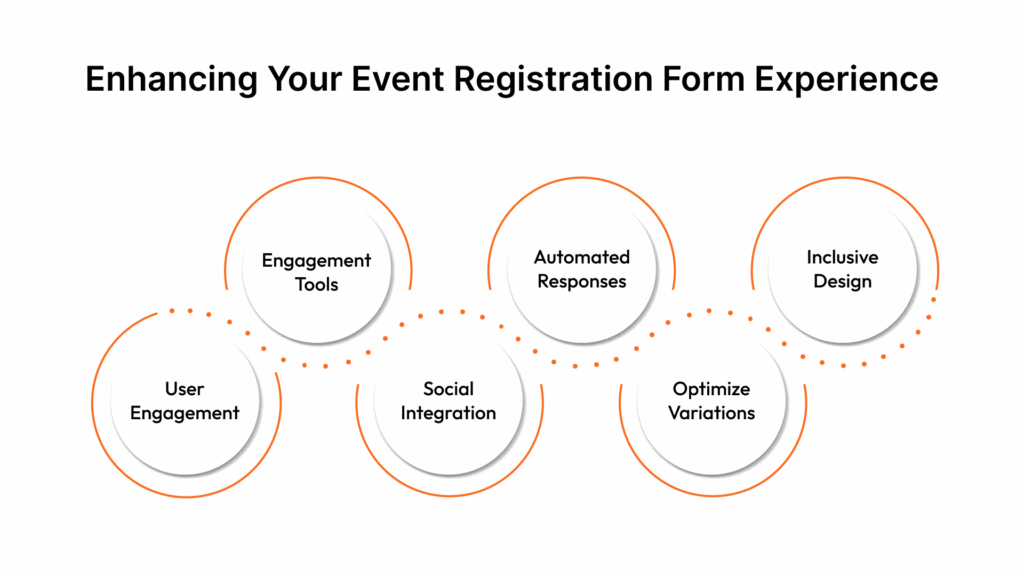
This phase is where the complexity of event logistics truly becomes apparent. It’s no longer just about theoretical preparation; it’s about coordinating multiple moving parts, responding to last-minute changes, and ensuring that everything stays on track.
1. Early Setup and Vendor Coordination
Early setup is crucial for ensuring everything is in place before the event begins. Effective vendor coordination is key to a smooth execution.
- Vendor Arrivals: Confirm delivery times and ensure vendors arrive on schedule.
- Setup Order: Prioritize high-impact areas like registration, tech setups, and catering.
- Loading Dock Access: Ensure clear pathways for unloading materials and equipment.
- Vendor Check-ins: Assign staff to oversee vendor arrivals, confirming setup requirements.
- Space Allocation: Ensure each vendor has assigned space and understands their setup area.
- Coordination: Confirm that all vendors adhere to the event timeline and work in sync.
- Equipment Setup: Double-check all AV equipment, lighting, and tech setups early.
- Backup Plans: Have contingency measures in case of delays or missing materials.
Designate a troubleshooting team to address unexpected issues. This could involve tech failures, venue-related issues, or last-minute schedule changes.
2. Scheduling a Final Run-Through
A quick inspection ensures that everything is as planned and gives you the chance to make real-time adjustments before guests arrive. A final pre-event walk-through is essential to ensure all logistics, from registration desks to signage and equipment are in place and functioning smoothly. This quick inspection allows you to identify and fix any issues before guests arrive, preventing disruptions and ensuring a seamless event flow.
3. Managing Guest Flow and Engagement
Efficient guest flow management is crucial for an organized event, ensuring guests move through the venue seamlessly while staying engaged.
- Registration process: Set up multiple check-in points to avoid long lines. Use digital check-ins or self-registration kiosks to streamline guest entry.
- Guest segmentation: Divide guests into groups (VIPs, speakers, general attendees) to direct them efficiently to different areas.
- Clear signage: Place clear, visible signs directing guests to important areas (sessions, lounges, bathrooms, etc.).
- Staff assistance: Position staff throughout the venue to guide guests and answer questions.
- Flow monitoring: Continuously monitor guest movement. Adjust staff allocation if certain areas become congested.
- Session transitions: Ensure smooth transitions between sessions by timing breaks effectively and managing the flow of guests entering and exiting rooms.
- Crowd control: Use barriers or roping systems to guide attendees and prevent crowding in high-traffic areas like entrances and exits.
4. Staff Visibility and Problem-Solving Roles
Clear event logistics rely on effective staff visibility and the swift delegation of problem-solving roles to ensure smooth operations.
- Staff identification: Ensure staff are easily identifiable with uniforms or badges.
- Designated roles: Assign specific duties to staff, such as handling registration, managing tech issues, or guiding guests.
- Problem-Solving Team: Designate a team to handle issues like technical malfunctions, schedule changes, or vendor delays.
- Communication channels: Ensure all staff have access to real-time updates and can communicate quickly.
- Visible presence: Position staff in high-traffic areas, such as entry points and session halls, for easy access
5. Real-Time coordination with technology
Without proper technology solutions, real-time event logistics become a guessing game. and Wiz-Team’s Event-Works platform is built to ensure smooth execution through seamless integration of technology.
- Centralised management: Everything from guest registrations to vendor schedules is managed in one centralised platform, ensuring easy access and visibility.
- Live updates: The platform delivers real-time updates on critical logistics, allowing event managers to monitor progress and address issues instantly.
- Streamlined communication: Communication with staff, vendors, and attendees is simplified, ensuring that everyone stays on the same page throughout the event.
- Rapid response: With real-time data and quick access to information, event managers can make data-driven decisions and adapt to changes with ease.
Once the event is successfully executed, the final step is to evaluate and refine, moving into Phase 3, where post-event logistics and feedback help optimise future events.
Phase 3: Post-Event Logistics: Breakdown & Reflection
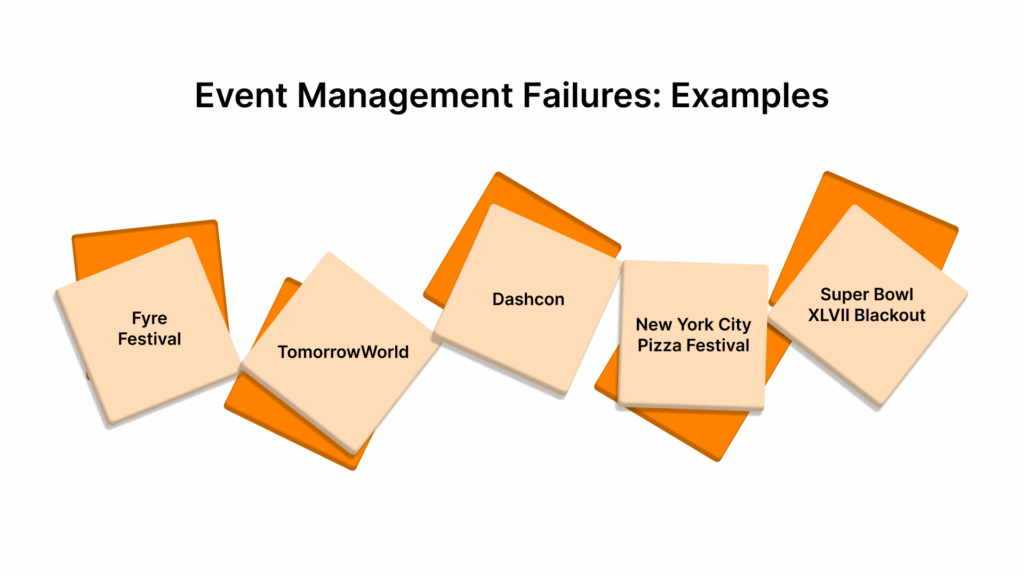
Post-event logistics are often overlooked, yet they are just as critical as the pre-event planning and on-the-day execution. This phase involves wrapping up operations, ensuring that everything is cleaned up, vendors are paid, and any remaining tasks are handled promptly. It also provides an opportunity for reflection, where lessons are learned and insights are gathered to improve future events.
Structured Teardown
Just as the event setup was carefully planned, the teardown should be executed with precision. Assign specific staff members to oversee the dismantling process and ensure that everything is returned to its rightful place.
Data Collection and Analysis
Collect feedback from attendees, vendors, and staff. Survey attendees on their experience, gather staff insights, and review vendor performance to see what worked and what didn’t.
Financial finalisation
Review the event’s budget, make sure all vendors are paid, and confirm that no expenses were overlooked.
Reflection and Improvement
Reflect on what went well and what could be improved for future events. Use the insights gathered to refine logistical processes and enhance future planning.
While event logistics can be complex, having the right tools can simplify the entire process. This is where Wiz-Team and their Event-Works platform come in, offering tailored solutions to streamline every phase of your event logistics
How Wiz-Team’s Event-Works Platform transforms event logistics
Managing large event logistics often involves juggling multiple systems and departments, leading to inefficiencies and data silos. Wiz team’s Event-Works is a centralised, modular, cloud-based solution designed to manage all aspects of event logistics, from registration to post-event evaluation.
Some core functionalities include:
- Event registration: Tailored registration workflows, handling large numbers of participants, and automating sign-ups.
- Workforce management: Scheduling, assigning tasks, and managing volunteers and event staff.
- Post-Event reporting: Comprehensive reports and analytics to evaluate the success of the event and identify areas for improvement.
- Feedback collection: Tools to collect attendee, staff, and vendor feedback to improve future events.
Technical support and on-demand assistance
Beyond the platform, Wiz-Team offers expert technical support to assist with any issues that may arise during the event:
- On-Site Technical Support: Dedicated teams to manage and resolve any technical challenges during the event.
- Event Setup and Implementation: Wiz-Team can assist with setting up Event-Works for your specific event needs, including configuration and integration with third-party systems.
Wiz-Team’s Proven Success in Event Logistics Across Major Events
Wiz-Team has been the trusted partner for numerous high-profile events, including:
- SportAccord 2024: Provided comprehensive event management solutions, from registrations to access control, for the World Sport & Business Summit.
- Birmingham 2022 Commonwealth Games: Delivered accreditation, access control, and volunteer management systems, ensuring seamless operations throughout the Games.
- European Commission: Implemented a Visitor Management System to streamline the registration and access control for over 500,000 visitors annually, ensuring smooth operations and enhanced security.
- Noor Riyadh Festival of Lights: Supported the 2022 Noor Riyadh Festival with a comprehensive Festival Management System, managing registrations, accommodations, access control, and real-time reporting for thousands of participants.
At Wiz-Team, we know that every event is unique. That’s why Event-Works is fully customizable, allowing you to choose the exact features you need to deliver a seamless experience.
Conclusion
An efficient event logistics principle always follows a cyclical process. The feedback and lessons learned from post-event evaluation help refine the pre-event planning process for future events. As each event provides valuable insights, the logistics process becomes more efficient over time. This continuous learning loop ensures that every logistical challenge becomes an opportunity to improve.
But achieving this level of efficiency and success doesn’t happen by chance. It requires a strategic approach, careful planning, and, most importantly, the right tools. Wiz-Team’s Event-Works is designed to help event professionals with a flexible, scalable platform that adapts to every logistical need.
Contact Wiz-team to learn how we can help you transform your logistics process and set the stage for your most successful event yet. Your next event with Wiz-Team can be your best one yet!
FAQs
1. What are the key components of event logistics?
Key components include venue selection and management, transportation and accommodation arrangements, equipment and technology needs, catering, staffing, and guest registration. Each element must be coordinated to ensure smooth event operations and a positive attendee experience.
2. How do you create an effective event logistics plan?
Start by defining clear event objectives and developing a detailed timeline. Break the event into actionable phases, assign responsibilities, and set deadlines for each task. Use checklists to track progress and ensure nothing is overlooked, from vendor coordination to equipment setup and guest communications.
3. What are common challenges in event logistics and how can they be overcome?
Common challenges include last-minute changes, vendor delays, technical issues, and guest flow problems. These can be managed by building buffer times into your schedule, maintaining frequent communication with vendors and staff, testing equipment in advance, and having contingency plans for key logistics like catering and transportation.
4. How can technology improve event logistics management?
Technology streamlines logistics through tools for online registration, ticketing, real-time communication, and live updates. Platforms can centralize information, automate confirmations, and provide analytics, making it easier to manage schedules, track attendees, and resolve issues quickly.
5. Why is post-event logistics important for future event success?
Post-event logistics involve teardown, vendor payments, feedback collection, and reviewing key metrics. This phase ensures all tasks are completed, provides valuable insights for improvement, and helps refine processes for future events, leading to greater efficiency and success.
#WizJourney

